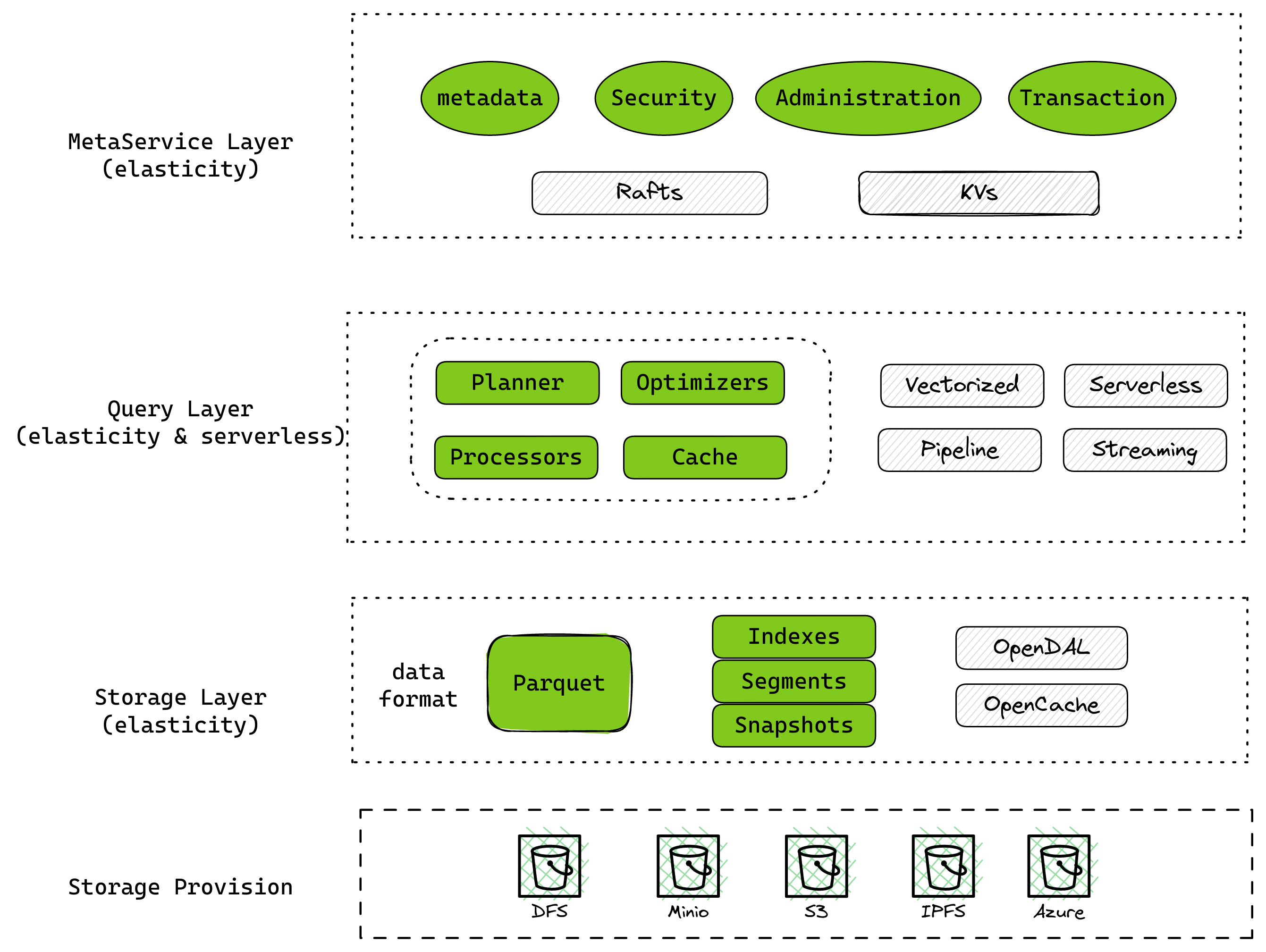Databend is an open-source Elastic and Workload-Aware modern cloud data warehouse that focuses on Low-Cost and Low-Complexity for your massive-scale analytics needs. The open-source alternative to Snowflake, Databend is crafted in Rust, enabling superior performance and efficiency.
Databend uses the latest techniques in vectorized query processing to allow you to do blazing-fast data analytics on object storage: (S3, Azure Blob, Google Cloud Storage, Alibaba Cloud OSS, Tencent Cloud COS, Huawei Cloud OBS, Cloudflare R2, Wasabi or MinIO).
-
Lakehouse Architecture
Databend's Lakehouse architecture combines the scalability of data lakes with the speed of data warehouses, supporting data reads from Hive and Iceberg for streamlined accessibility and flexibility.
-
Feature-Rich
Support for atomic operations including
SELECT/INSERT/DELETE/UPDATE/REPLACE/COPY/ALTERand advanced features like Time Travel, Multi Catalog(Apache Hive/Apache Iceberg). -
Instant Elasticity
Databend completely separates storage from compute, which allows you easily scale up or scale down based on your application's needs.
-
Blazing Performance
Databend leverages data-level parallelism(Vectorized Query Execution) and instruction-level parallelism(SIMD) technology, offering blazing performance data analytics.
-
Git-like MVCC Storage
Databend stores data with snapshots, enabling users to effortlessly query, clone, or restore data from any history timepoint.
-
Support for Semi-Structured Data
Databend supports ingestion of semi-structured data in various formats like CSV, JSON, and Parquet, which are located in the cloud or your local file system; Databend also supports semi-structured data types: ARRAY, TUPLE, MAP, JSON, which is easy to import and operate on semi-structured.
-
Easy to Use
Databend has no indexes to build, no manual tuning required, no manual figuring out partitions or shard data, it’s all done for you as data is loaded into the table.
The fastest way to try Databend, Databend Cloud
Prepare the image (once) from Docker Hub (this will download about 170 MB data):
docker pull datafuselabs/databendTo run Databend quickly:
docker run --net=host datafuselabs/databendDeploying Databend
Connecting to Databend
Loading Data into Databend
Loading Data Tools with Databend
Managing Users
Managing Databases
Managing Tables
Managing Views
AI Functions
Data Governance
Securing Databend
Performance
Databend is an open source project, you can help with ideas, code, or documentation, we appreciate any efforts that help us to make the project better! Once the code is merged, your name will be stored in the system.contributors table forever.
To get started with contributing:
For general help in using Databend, please refer to the official documentation. For additional help, you can use one of these channels to ask a question:
- Slack (For live discussion with the Community)
- GitHub (Feature/Bug reports, Contributions)
- Twitter (Get the news fast)
- I'm feeling lucky (Pick up a good first issue now!)
Databend is released under a combination of two licenses: the Apache License 2.0 and the Elastic License 2.0.
When contributing to Databend, you can find the relevant license header in each file.
For more information, see the LICENSE file and Licensing FAQs.
- Databend is inspired by ClickHouse and Snowflake.
- Databend's computing model is based on Arrow2, Arrow2 is a faster and safer implementation of the Apache Arrow Columnar Format.
- The documentation website is hosted by Vercel.





